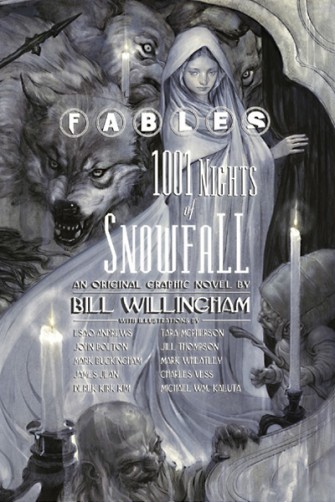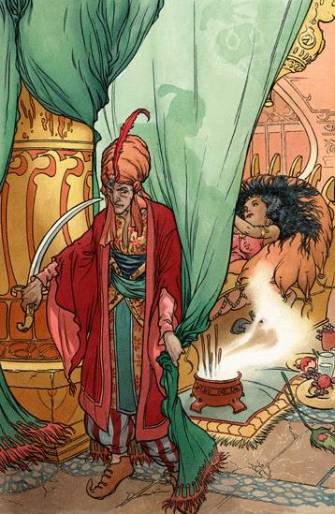
June 12, 2007
 CR Review: Fables: 1001 Nights of Snowfall
CR Review: Fables: 1001 Nights of Snowfall

 Creators:
Creators: Bill Willingham, Esao Andrews, Brian Bolland, John Bolton, Mark Buckingham, James Jean, Michael Wm Kaluta, Derek Kirk Kim, Tara McPherson, Jill Thompson, Charles Vess, Mark Wheatley
Publishing Information: DC/Vertigo, Hardcover, 144 pages, October 2006, $19.99
Ordering Numbers: 1401203671 (ISBN)
This is a very lovely book, and in many ways a fascinating one, in that it seems to exist in multiple places at once. It's both an entry-level hook into Vertigo's successful
Fables comic book and trade paperback series
and a stand-alone volume. It's a single narrative and an anthology. It's a showcase for top-tier artistic talent
and a throwback in terms of the type of talent on display. It's a prequel
and in several ways an addition to what the reader knows about the series' main characters. It's told in a modern voice, but may remind many of fantasy comics from 25-35 years ago, with a bit of violence and a few moments of nudity. The book neatly encapsulates all the pleasures of the series and Bill Willingham's entertaining modern soap opera take on all that classic bedtime story material, but also shows how that material continues to rattle around, a rough fit for the kind of Vertigo treatment that feels more whole than
Fables has.
Fables: 1001 Nights of Snowfall is the kind of story that has some pleasure to it on a first reading, but you sense even then that it doesn't all fit together as well as it would like.

One of those weird loose ends comes right up top, with the story's overarching concept. The conceit is that Snow White seeks the aid of the Persian King Shahryar against the Adversary that has dogged and pursued and killed the European fables characters. This is the same king from the legend of Scheherazade, the Persian queen who so entertained and educated the king with her 1001 nights of stories that she avoided a one-night-and-then-beheading edict that he put in place due to tragedy and a broken heart, and married him. According to this volume, she pulls the same trick a bit earlier, and the comics shorts are the result. This is clever, although I can't be the only reader to make the uh-oh face when considering the implications of a white woman enabling the Scheherazde legend by getting there first. The flip-side of using such rich source materials is that they're both general and specific, and all apologies to Joseph Campbell and his notion of translatable archetypes, moving a very specific iteration of a folk tale from one context to another can sometimes set loose unintended messages. In other words, it's not so much that any reader will think the creators are racist by putting Snow White over the Persian Queen, but they may notice that things don't fit together as well as they might.
I found a similar dissonance took place within the stories, where sequences seemed out of place or strangely paced according to what I can only guess is something that would resonate with series fans. This includes a page where Prince Charming is made out to be sort of rake in "The Fencing Lessons," some back and forth between Snow White and Rose Red in "Diaspora" that didn't track as having much to do with the affairs on hand, and the curious decision to end "Fair Division" and the stories themselves, with King Cole signing legislation into effect that has dramatic impact within the comic. In fact, I'm not sure how Snow White avoided execution with that last one. The entire notion of the Adversary and his army of bad folks, also ended up being one of those half and half deals: the invading army remains appropriately brutal and violent and frightening, but there's something about the entire notion that doesn't feel as specific and grounded and organic as the fables from which these stories sprang. I don't know the series well enough to know if this is intentional; I can certainly see a point being made about the difference between fables and fantasy.
That's not to say there isn't a lot to enjoy here. Much of the book is gorgeous. There are illustrations by the team of Kaluta and Vess, pages by Jill Thompson, and designs by Tara McPherson that are top-notch fantasy. The book also use artists like Brian Bolland and John Bolton extremely well. Willingham's scripts are much more lively and funny than I'm used to from a lot of Vertigo work, and I found myself kind of liking his twist on the Seven Dwarves story (as obvious as it is) and the Big Bad Wolf (which never would have occurred to me). I know if I were a fan of the series, I would probably very much enjoy this kind of handsome addition to the canon. As someone on the outside, it still feels more like a concept that spends as much time shaking itself apart as it does in bringing a new perspective to old tales.
 posted 1:00 pm PST
posted 1:00 pm PST |
Permalink
Daily Blog Archives
November 2019
October 2019
September 2019
August 2019
July 2019
Full Archives


